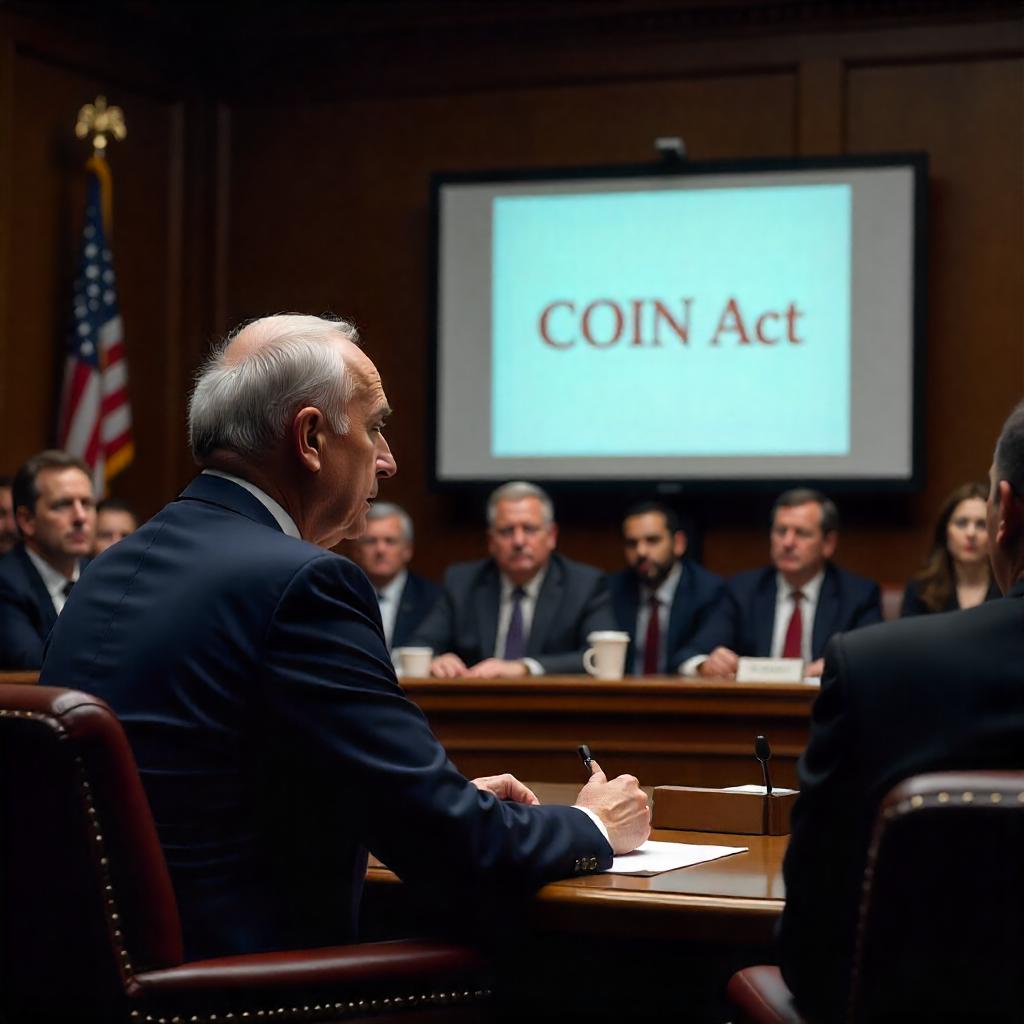In the ever-evolving landscape of cryptocurrency, where innovation often outpaces regulation, the introduction of the Curbing Officials’ Income and Nondisclosure (COIN) Act marks a pivotal moment in the United States’ approach to digital asset governance. On June 23, 2025, Senator Adam Schiff (D-CA) introduced this legislation, aiming to address growing concerns over potential conflicts of interest among public officials involved in cryptocurrency activities. The bill seeks to establish ethical boundaries by prohibiting high-ranking government officials, including the President, Vice President, members of Congress, and their immediate families, from profiting off digital assets during and after their terms in office. This legislative move comes in the wake of revelations that President Donald Trump and his family have engaged in significant cryptocurrency ventures, raising questions about the intersection of public service and private financial gain.
The COIN Act proposes a comprehensive framework to prevent public officials from exploiting their positions for personal profit in the burgeoning digital asset market. Specifically, it prohibits these officials from issuing, sponsoring, or endorsing any form of cryptocurrency, including stablecoins, non-fungible tokens (NFTs), and meme coins, both during their tenure and for a period extending 180 days before and two years after their service. Violations of these provisions could result in civil penalties equal to the profits gained and potential imprisonment for up to five years.
This legislative initiative is a direct response to the increasing scrutiny over the financial activities of public officials in the cryptocurrency space. Reports have highlighted that President Donald Trump and his family have profited substantially from crypto ventures, including the launch of a meme coin and involvement in the USD1 stablecoin project through World Liberty Financial. These developments have sparked debates about the ethical implications of such engagements and the need for clear regulatory boundaries to maintain public trust in government institutions.
The introduction of the COIN Act signifies a critical juncture in the ongoing discourse surrounding cryptocurrency regulation and ethical governance. As the digital asset market continues to expand, the need for robust frameworks to ensure transparency and accountability among public officials becomes increasingly apparent. The COIN Act represents a concerted effort to address these concerns and establish a precedent for ethical conduct in the intersection of public service and digital finance. In the following sections, we will delve deeper into the specifics of the COIN Act, examining its provisions, the motivations behind its introduction, and the potential implications for public officials and the broader cryptocurrency landscape.
Understanding the COIN Act
The Curbing Officials’ Income and Nondisclosure (COIN) Act, introduced by Senator Adam Schiff on June 23, 2025, is a legislative response to growing concerns over the intersection of public office and private financial gain in the realm of digital assets. This bill seeks to establish ethical boundaries by prohibiting high-ranking government officials, including the President, Vice President, members of Congress, and their immediate families, from profiting off digital assets during and after their terms in office.
The primary provisions of the COIN Act include:
Prohibition on Digital Asset Activities: The bill prohibits public officials from issuing, sponsoring, or endorsing any form of cryptocurrency, including stablecoins, non-fungible tokens (NFTs), and meme coins, both during their tenure and for a period extending 180 days before and two years after their service.
Mandatory Disclosure: Public officials are required to disclose any existing digital asset holdings and include digital assets in their annual financial disclosures and periodic transaction reports.
Conflict of Interest Considerations: The issuance, purchase, sale, or holding of digital assets are considered financial interests that public officials must consider when recusing themselves from official matters under the criminal conflict of interest statute.
Certification for Stablecoin Issuers: Stablecoin issuers must certify quarterly with the Office of Government Ethics and regulators that public officials are not personally profiting from the issuance of such stablecoins to receive regulatory approval.
Government Accountability Office (GAO) Report: The GAO is tasked with submitting a report to Congress within 360 days with recommendations to update federal ethics laws to incorporate future regulatory frameworks related to digital assets.
These provisions aim to address potential conflicts of interest and ensure that public officials do not exploit their positions for personal financial gain in the rapidly evolving digital asset market.
The introduction of the COIN Act is a direct response to concerns over the financial activities of public officials in the cryptocurrency space. Reports have highlighted that President Donald Trump and his family have profited substantially from crypto ventures, including the launch of a meme coin and involvement in the USD1 stablecoin project through World Liberty Financial. These developments have sparked debates about the ethical implications of such engagements and the need for clear regulatory boundaries to maintain public trust in government institutions.
The COIN Act represents a significant step toward ensuring ethical conduct among public officials concerning cryptocurrency investments. As the digital asset market continues to expand, the need for robust frameworks to ensure transparency and accountability among public officials becomes increasingly apparent. The COIN Act seeks to establish such a framework, aiming to prevent the misuse of public office for personal financial gain in the digital asset space.
Political Context and Motivation
The introduction of the COIN Act by Senator Adam Schiff on June 23, 2025, is a direct response to growing concerns over the intersection of public office and private financial gain in the realm of digital assets. This legislation aims to address potential conflicts of interest and ethical dilemmas arising from public officials’ involvement in cryptocurrency activities.
Central to the motivation behind the COIN Act is the scrutiny surrounding former President Donald Trump’s extensive engagement with the cryptocurrency industry. In 2024, financial disclosures revealed that Trump earned over $57 million through his venture with World Liberty Financial, a company associated with his family that launched the USD1 stablecoin. This revelation raised significant ethical, legal, and constitutional concerns regarding the use of public office for personal enrichment.
Senator Schiff emphasized the need for greater scrutiny of the president’s financial dealings, stating, “We need far greater scrutiny of the president’s financial dealings, and to stop him and any other politician from profiting off of such schemes.” The COIN Act seeks to prevent the financial exploitation of digital assets by public officials, including the president and their immediate family, by implementing stricter ethical standards and transparency requirements.
The bill has garnered support from various lawmakers and advocacy groups who recognize the necessity of establishing clear boundaries to maintain public trust and prevent potential misuse of power. However, the COIN Act faces challenges in a politically divided Congress, where advancing such legislative measures may encounter resistance from those who argue it could hinder technological innovation and financial inclusion.
As the digital asset market continues to expand, the COIN Act represents a critical step in ensuring that public officials adhere to ethical standards that prioritize the public interest over personal financial gain. The outcome of this legislative effort will have significant implications for the future of cryptocurrency regulation and the integrity of public office in the United States.
Implications for Cryptocurrency Stakeholders
The introduction of the COIN Act carries significant implications for various stakeholders within the cryptocurrency ecosystem, particularly public officials, the cryptocurrency industry, and investors. Understanding these impacts is crucial for navigating the evolving regulatory landscape.
For Public Officials
The COIN Act imposes stringent restrictions on public officials, including the President, Vice President, members of Congress, and their immediate families. These individuals are prohibited from issuing, sponsoring, or endorsing any form of digital asset—such as cryptocurrencies, non-fungible tokens (NFTs), and stablecoins—during their tenure and for a period extending 180 days before and two years after their service. This prohibition aims to prevent conflicts of interest and ensure that public officials do not exploit their positions for personal financial gain in the digital asset market.
Additionally, the legislation mandates that public officials disclose any existing digital asset holdings and include these assets in their annual financial disclosures and periodic transaction reports. The issuance, purchase, sale, or holding of digital assets are considered financial interests that public officials must consider when recusing themselves from official matters under the criminal conflict of interest statute. These measures are designed to enhance transparency and accountability in government dealings with digital assets.
For the Cryptocurrency Industry
The COIN Act introduces new compliance requirements for cryptocurrency firms, particularly those involved in issuing stablecoins. Stablecoin issuers must certify quarterly with the Office of Government Ethics and regulators that public officials are not personally profiting from the issuance of such stablecoins to receive regulatory approval. This provision aims to prevent public officials from leveraging their positions to benefit from the issuance of digital assets.
Furthermore, the legislation could influence the development and promotion of digital assets. Public officials’ involvement in endorsing or promoting cryptocurrencies may be curtailed, potentially affecting the adoption and acceptance of certain digital assets. Cryptocurrency firms may need to reassess their marketing strategies and partnerships to align with the new regulatory framework.
For Investors and Users
The COIN Act seeks to enhance trust in the integrity of public officials’ financial dealings, which could positively impact investor confidence in the cryptocurrency market. By addressing potential conflicts of interest, the legislation aims to create a more transparent and accountable environment for digital asset transactions.
However, the restrictions imposed by the COIN Act may also lead to increased regulatory scrutiny and compliance costs for cryptocurrency firms. These factors could influence the availability and accessibility of certain digital assets, potentially affecting investment opportunities for users.
Comparative Analysis with Other Legislative Efforts
The introduction of the COIN Act by Senator Adam Schiff represents a significant development in the ongoing efforts to regulate the intersection of cryptocurrency and public office in the United States. While the COIN Act aims to address specific ethical concerns related to public officials’ involvement in digital assets, it exists within a broader legislative landscape that includes other initiatives with varying scopes and objectives.
GENIUS Act: A Focus on Stablecoin Regulation
One notable piece of legislation is the GENIUS Act, passed by the Senate on June 17, 2025, with a vote of 68-30. This bipartisan bill focuses on regulating stablecoins, a form of cryptocurrency typically pegged to the U.S. dollar. The GENIUS Act introduces regulatory guardrails and consumer protections for stablecoins, marking a significant legislative step for digital assets. However, the bill has faced criticism from some Democrats who argue that it fails to address potential conflicts of interest involving President Donald Trump, who has financial ties to the crypto industry, including a significant stake in World Liberty Financial and its stablecoin USD1. The GENIUS Act bans Congress members and their families from profiting off stablecoins but exempts the President and his family. This exemption has raised concerns about the adequacy of the legislation in preventing ethical conflicts.
TRUMP in Crypto Act: Targeting Presidential Profiteering
In response to concerns over President Trump’s involvement in cryptocurrency, Representative Maxine Waters introduced the TRUMP in Crypto Act. This bill aims to prevent the president from profiting from cryptocurrency markets by prohibiting the issuance or endorsement of digital assets by the president and their immediate family members. The TRUMP in Crypto Act seeks to close the loophole left by the GENIUS Act by explicitly addressing presidential involvement in the crypto industry. However, the bill faces challenges in gaining bipartisan support and advancing through the legislative process.
International Perspectives: Global Approaches to Crypto Regulation
Beyond the United States, other countries have also introduced legislation to regulate cryptocurrency and prevent conflicts of interest among public officials. For instance, in the United Kingdom, the Financial Conduct Authority (FCA) has implemented regulations requiring public officials to disclose any holdings in digital assets and to recuse themselves from decisions that may affect the value of those holdings. Similarly, in Canada, the Conflict of Interest Act has been amended to include provisions related to cryptocurrency, prohibiting public office holders from engaging in activities that could create a conflict between their private interests and public duties.
Future Outlook
The introduction of the COIN Act by Senator Adam Schiff represents a significant development in the ongoing efforts to regulate the intersection of cryptocurrency and public office in the United States. As the legislative process unfolds, several potential outcomes and implications are emerging.
Potential Challenges
The COIN Act faces several hurdles in its path to becoming law. One of the primary challenges is the political landscape. With Republicans holding a majority in the House of Representatives and a slim margin in the Senate, passing the COIN Act may require bipartisan support, which could be difficult to achieve given the partisan divisions on cryptocurrency regulation.
Additionally, the bill’s provisions may face legal challenges. Opponents may argue that the restrictions imposed by the COIN Act infringe upon the rights of public officials, including the First Amendment right to free speech and the Fifth Amendment right to engage in lawful economic activities. Such challenges could delay the implementation of the bill and require judicial review.
Opportunities for Reform
Despite these challenges, the COIN Act presents an opportunity to establish clear ethical standards for public officials’ involvement in cryptocurrency. If enacted, the bill could set a precedent for future legislation aimed at preventing conflicts of interest and ensuring transparency in the digital asset space.
Moreover, the COIN Act could stimulate broader discussions about the role of digital assets in governance and the need for comprehensive regulatory frameworks. As the cryptocurrency market continues to evolve, the lessons learned from the COIN Act could inform future policy decisions and contribute to the development of a more robust regulatory environment.
Implications for Stakeholders
For public officials, the COIN Act underscores the importance of maintaining ethical boundaries and avoiding situations that could lead to conflicts of interest. Compliance with the bill’s provisions would require careful consideration of financial activities and transparency in disclosures.
For the cryptocurrency industry, the COIN Act highlights the increasing scrutiny of digital asset activities by lawmakers and regulators. Companies operating in the space may need to reassess their business practices and ensure that they adhere to emerging ethical standards to maintain public trust and avoid potential legal issues.
For investors and users, the COIN Act could enhance confidence in the integrity of the cryptocurrency market. By addressing concerns about the potential for exploitation by public officials, the bill aims to create a more transparent and accountable environment for digital asset transactions.
Final Thought
The COIN Act represents a critical step in the ongoing efforts to regulate the intersection of cryptocurrency and public office. While challenges remain, the bill presents an opportunity to establish clear ethical standards and promote transparency in the digital asset space. As the legislative process continues, stakeholders across the cryptocurrency ecosystem must stay informed and prepared for potential changes in the regulatory landscape.





